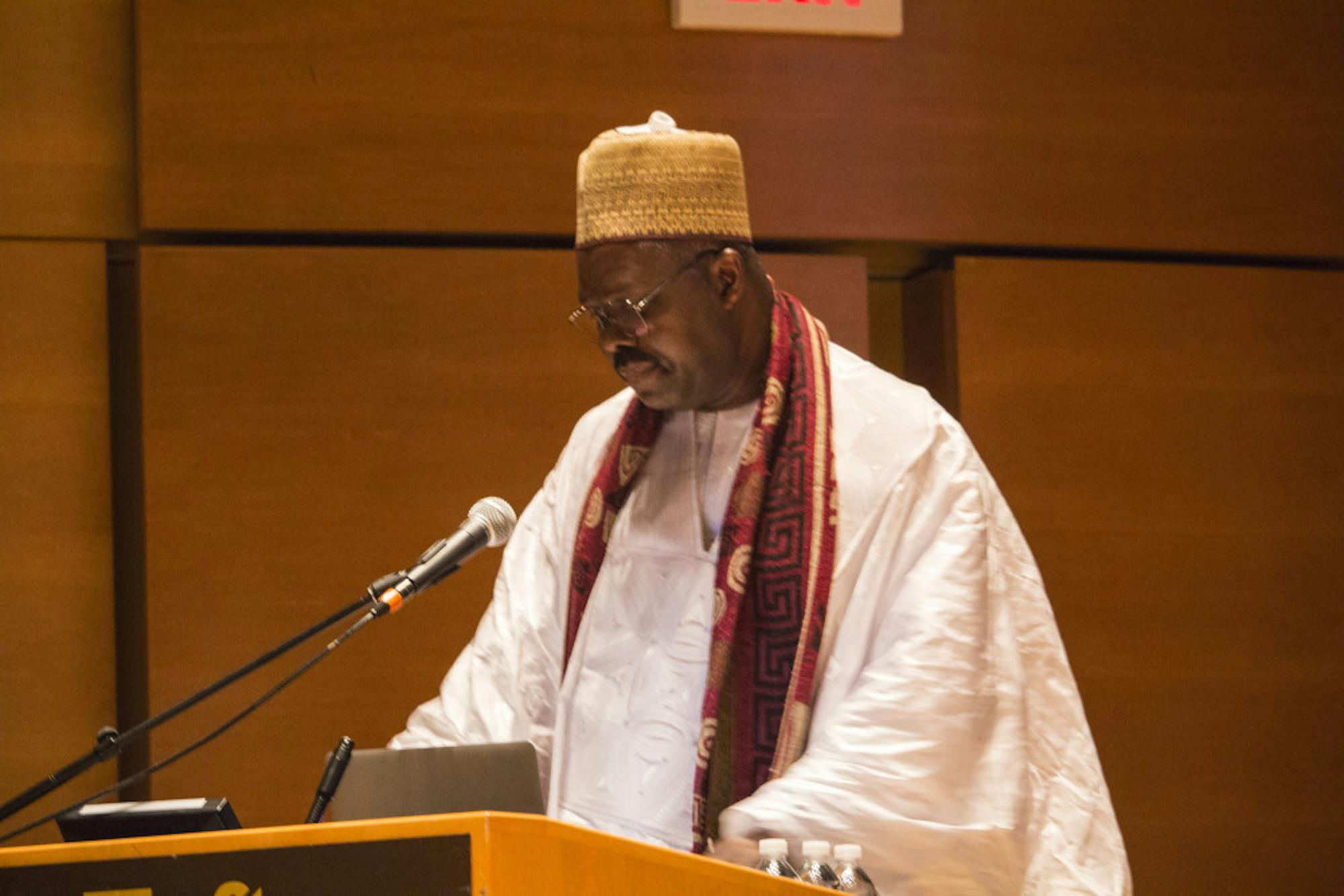Saïda Oumoulkhairy Ibrahim Niasse, the leader of a Sufi Muslim women’s movement in Niger, was honored by the university with the Global Humanitarian Citizen Award during a ceremony in Distler Hall on Wednesday afternoon.
The ceremony was hosted by the Jonathan M. Tisch College of Civic Life and cosponsored by the Departments of Political Science and Music. Saïda Oumoulkhairy Ibrahim Niasse, known by her followers as Kiota, as her followers call her, is the Global Humanitarian Citizen Award’s inaugural recipient. Associate Dean for Research in the Tisch College and Lincoln Filene Professor of Citizenship & Public Affairs Peter Levine told the Daily that the award, which he said would likely be given in future years, was created to recognize Mama Kiota.
Mama Kiota has been an advocate for empowering rural African women for over 50 years, according to Associate Professor of Political Science Pearl Robinson. Event speakers described how Mama Kiota has founded community schools and grown her women’s organization Jamiyat Nassirat Din (JND) to 200,000 members in Niger and beyond.
Levine began the ceremony with a brief introduction to Mama Kiota’s efforts. Then Celene Ibrahim, Muslim chaplain for Tufts, came to the podium and praised Mama Kiota for her righteous leadership in an unrighteous time.
“In an age where many of our leaders are in some ways deplete of, seemingly, an inner moral compass, it is heartening to know that there are people who are still able to guide and lead and teach and inspire,” she said.
Ousmane Oumar Kane, a nephew of Mama Kiota’s and a professor of Contemporary Islamic religion and society at the Harvard Divinity School, spoke next about Mama Kiota’s efforts with Robinson, who has studied JND as a part of her political science research.
Kane said that Robinson cared for Mama Kiota’s community when other scholars didn’t.
“Dozens of scholars visit these communities every year in order to collect data, to write books, to promote their own career," he said. "But very few care about these communities, and worry about what they could do to support them.”
Robinson has also played a major part in expanding Mama Kiota’s international visibility; Kane said that without her, Tisch College would never have known about Mama Kiota or her work.
Over the course of her working relationship with Mama Kiota, Robinson has sent students to Niger to study her efforts and spoken about her research at universities around the United States. She also produced a documentary of Mama Kiota, clips of which were shown during the ceremony.
Mama Kiota did not attend the ceremony due to logistical issues, according to Levine. Her son, Sékou Aboubacar Hassoumi, accepted the award on her behalf.
“This ceremony is proof that mankind is the same everywhere,” Hassoumi read from a speech written by Mama Kiota. “No matter from what part of the globe we are from, our skin color, our religion, our gender, we all want the same things: peace, love, progress and well-being.”
Hassoumi also gave his personal take on Mama Kiota’s impact.
“I wouldn’t be standing here today talking to you in English if it wasn’t for Mama Kiota’s dedication to give us a good education,” he said.
Robinson returned to the podium and shared anecdotes of Mama Kiota’s community efforts. She recalled a gathering of local leaders where Mama Kiota advocated for broad equality for women.
“To my soldiers, the women,” Robinson quoted Mama Kiota as saying. “Men, let your daughters go to school, like your sons. Let your wives work and earn money. If they earn money the family will prosper.”
Robinson said she was struck by Mama Kiota’s political tones, especially in the context of Muslim-majority Niger, which she said would not be a site for gender equality movements in many Americans' eyes.
“Nobody would believe this in America,” she recalls. “I’m here, and even I can hardly believe it.”
Mama Kiota has also shown her dedication to equality issues through JND, which Robinson said uses its quadrennial congress to showcase the power of Muslim women. Robinson said that past conference themes have included “The Role of Muslim Women in Educating the Young,” and “The Contributions of Muslim Women to Poverty Reduction.”
The ceremony concluded with a series of musical presentations. Three members of a New England Conservatory Ensemble played on Nigerian instruments, and then one musician performed dhikr. Dhikr is a repetition-based prayer form in Sufism, the branch of Islam to which Mama Kiota belongs.
In an interview with the Daily after the event, Robinson said that Americans would be well-suited to rethink what they might assume about Islam and women.
“If you think that a lot of our military presence in the Muslim world is because we’re concerned about how Islam suppresses women. You need to know that there are some Muslim women where Islam isn’t suppressing them," she said.
Mama Kiota, Nigerien Muslim women's activist, recognized by university






